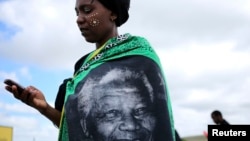A new study finds South Africa’s path to racial and social reconciliation following decades of aprtheid has several unexpected twists and turns.
The Institute for Justice and Reconciliation says South Africans are more often blurring race lines when it comes to trusting their fellow man - 20 years after the end of the racist system of apartheid.
The report finds trust between South Africans of different races has consistently risen in the past decade. That is illustrated by the discovery black South Africans trust their political leaders, who are usually also black, less than ever. A sentiment no doubt bolstered by a seemingly never-ending procession of high-level corruption scandals.
But IJC project leader Kim Wale said not all the news was positive and research showed in 2013 South Africans were about 10 percent less likely to agree that apartheid was a crime against humanity than they were just a decade earlier. The 2002 treaty establishing the International Criminal Court classified Apartheid a crime against humanity.
That loss of awareness of a widely held truth, she said, should be a concern.
“It is worrying because if we do not keep this memory alive, then we will not be tuned into addressing its legacy in the present, and unfortunately its legacy does really still remain with us,” said Wale.
She is referring to the wide economic disparities that still fall along race lines. The divisions are easy to see even to a casual observer in Johannesburg, the nation’s economic hub.
On one street corner in a trendy neighborhood filled with hip coffee shops, bookstores, restaurants and patrons of all races, VOA News finds race is still a sensitive topic. Many passers-by refused to share their views on race; others asked that we stick to their first names only.
Leslie, a 23 year old Black man, works on the streets sometimes as a car guard. The rest of the time, he said, he was unemployed, but he did not see his situation as a legacy of apartheid and did not really remember it. When asked about the nation’s historical inequalities, he came up blank.
“94? In 1999, I was in grade one! So my brain was not [old enough] to remember some things that they have been in the past,” he said.
Animator Paul Meyer, who is 40 and has three adopted children of a different race, said he was trying to raise his children in a land of equality and opportunity. But, he said, reconciliation was not happening everywhere.
“I think it is a mixed bag and you will get different answers depending on who you speak to. I think there is definitely movement in both directions,” said Meyer.
Beula Molefe, a 41-year-old domestic worker, said she thought part of the divisions were caused by the inability of the government to crack down on crime.
"What is stopping us is we did not reconcile yet. And we can not forgive each other. And there are a lot of things that are happening now that makes us angry each and every single day, like corruption and robbery and stealing, all those things,” she said.
The IJC report says the nation’s poor, who are almost all black, have been largely excluded from racial integration. Even the simple opportunity to socialize with people of other races narrows as income levels decreases.
Wale said South Africans needed to tear down their walls; first the psychological ones, and then, maybe, some actual ones that abound around homes and buildings as part extensive security measures in a crime-laden country.
“So building awareness is the first step. And then there is structural transformation which requires the fact that South Africa still often looks very similarly to how it used to look during apartheid. It is a problem, and we need to readdress the way our cities are structured so that the poor are excluded and the poor are left out. There are real structural changes that are required. But also changes in terms of how ordinary South Africans understand racism and the operation of racism in society,” said Wale.
But she said, South Africa has come a long way in just 20 years, though it has a long way to go.




